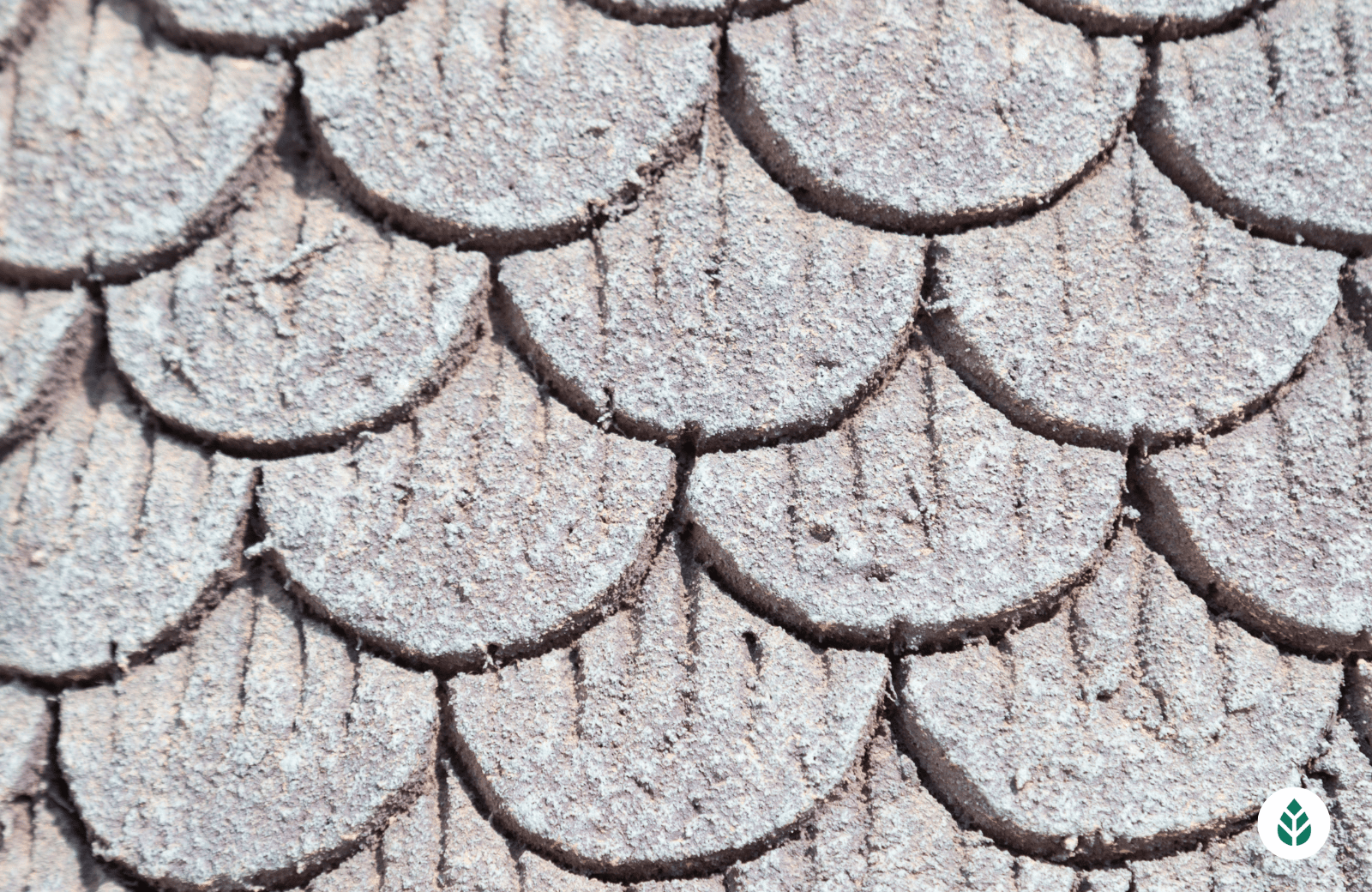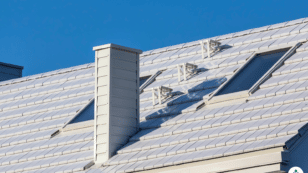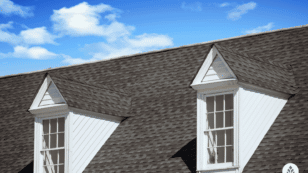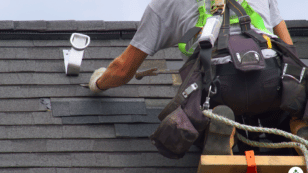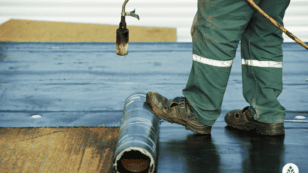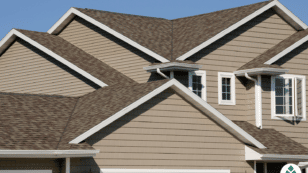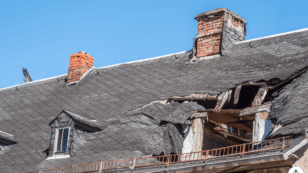

Concrete Roof Cost (Homeowners Guide 2024)
Average Concrete Roof Cost: $8,000–$20,000
- Concrete tile roofs can withstand extreme weather conditions, and last 50 years or more
- Concrete roofs are energy-efficient and recyclable
- Concrete roof tiles cost between $2 and $10 per square foot
Each product and or company featured here has been independently selected by the writer. You can learn more about our review methodology here. If you make a purchase using the links included, we may earn commission.
A concrete roof is made of thick, concrete tiles that are custom-fit for your home. Concrete roofing comes in many styles and colors, so don’t let the misconception that concrete is unattractive scare you away.
In reality, a concrete roof is a durable, cost-effective alternative to clay tiling that can impressively withstand harsh weather conditions.
If you’re ready to jump into your roofing project, select one of our top roofing providers below to get connected with a roofing professional and get a free, no-obligation quote.
Cost of Installing a Concrete Roof
The average cost of a 1,700-square-foot concrete roof installation is between $8,000 and $20,000. This is a final cost estimate that factors in both material and installation costs.
The average material cost for concrete tile roofing is between $2 and $10 per square foot. Keep in mind that your roof’s size, slope and pitch will largely determine the co
st of your new roof installation.
How To Calculate the Cost of Your New Concrete Roof
Every roofing project is unique. That’s why most roofing companies will send a representative to your home to complete an inspection before giving you a personalized quote.
However, that doesn’t mean that you can’t get an idea of how much a new concrete roof will cost you. Use the following calculations to estimate the material cost for your concrete roof:
$2 x size of your roof in square feet = Low-end cost of a concrete roof
$10 x size of your roof in square feet = High-end cost of a concrete roof
Remember that this estimate does not include labor costs or additional charges like disposal of your old roof and travel time. To get a more accurate estimate, call a professional for a free, personalized quote. You can select one of our top providers below to get started.

Power Home

Average cost
Pros
- Positive industry reputation
- Lifetime or lengthy warranty
- 10+ years of experience
- Positive customer reviews
- Uses eco-friendly materials
- Well-trained, certified installers
- Variety of roofing styles available
Cons
- Limited variety of roofing materials
- Short or nonexistent warranty
- No financing information available
- Expensive
- Little information available on company website

Erie Home

Zero Down - 18 months same as cash with minimum monthly payment
Average cost
Pros
- Lifetime or lengthy warranty
- Widespread availability
- 10+ years of experience
- Positive customer reviews
- Uses eco-friendly materials
- Financing options available
- Well-trained, certified installers
- Uses durable materials meant to last
- Variety of roofing styles available
Cons
- Limited variety of roofing materials
- Expensive

Aspen Contracting

Average cost
Pros
- Positive industry reputation
- Lifetime or lengthy warranty
- Widespread availability
- 10+ years of experience
- Positive customer reviews
- Financing options available
Cons
- Little information available on company website
Factors That Go Into Concrete Roof Pricing
Before you begin your roofing project, you should be aware of the many factors that go into the final price of a new roof.
In most cases, labor and material costs will be your largest expenses. If you’re considering a concrete roof, here’s what you should know about pricing factors:
Material Pricing for Concrete Roofs
The material price for concrete roofs is between $2 and $10 per square foot. More detailed concrete roofing styles can cost more than this.
In general, concrete roofs are cheaper than clay roofs. If you are considering a clay roof, but have a tighter budget, a concrete roof may be a great alternative.
Basic Labor Cost and Time to Complete Concrete Roof Installation
Considering a roof installation is very labor intensive, you can expect 50% or more of your total project cost to be for labor. This means you should expect labor to add at least $1,500 to the cost of your concrete roof materials.
Tile roof installation costs will vary depending on your location, but the national average cost of hiring a roofer is $75 an hour.
Concrete tiles are heavy. That means that your roof may need extra reinforcement before your contractor can install the new tiles. This will incur additional labor costs, so make sure you discuss your options with a professional first.
Removing Your Current Roof and Dump Fees
Before your new concrete tile roof can be installed, your old roof must be removed and disposed of. Discuss with your roofing contractor to establish who is responsible for discarding the old roof. Most roofing companies will do this for an additional charge.
You should also call your local solid waste management or recycling center to see if your old roof can be recycled. Most roofing types, including concrete, asphalt, metal and clay can be recycled, so make sure to check and see what facilities exist near you.
Size and Complexity of Your Roof
Roofing materials are generally priced by the square foot or by roofing square (100 sq ft). Of course, the larger your roof, the more you will pay for both materials and labor.
However, roof features like chimneys, skylight windows, multiple tiers, ventilation systems and more will make your roof installation more complex, adding to labor time and costs. If your roof has many valleys, facets or angles, your roofer will need to use more safety equipment and take more care during the installation. This also drives up costs.
If you’d like to be connected with one of our top-recommended roofing companies, select one of our preferred providers below to get started with a free, no-obligation quote.
Pros and Cons of Installing Concrete Roofs
Is a concrete roof right for you? Concrete roofs are durable, but their weight and “unattractive” appearance turn some homeowners away.
Pros of Concrete Roofs
- Long lasting: Concrete roofs can last 50 to 100 years, far more than an asphalt roof, which typically only lasts 20 years.
- Cost-effective: Although concrete tiles are not the cheapest roofing material out there, they are a budget-friendly alternative to a clay tile roof.
- Weather-resistant: Concrete roofs are resistant to heavy snow buildup, wind, hail and even fire.
- Recyclable: Concrete roofs are recyclable and need to be replaced less frequently than standard asphalt roofs. That means that they have a smaller environmental impact than other roofing types.
Cons of Concrete Roofs
- Heavy: Concrete roofing is far heavier than asphalt or metal. If you’re replacing an asphalt or metal roof with concrete tiles, make sure that the structure of your roof and home is strong enough to support the weight first.
- Difficult installation: Even if your roof does not need structural reinforcement to support the weight of concrete tiles, concrete can still be difficult to install. Your roofer will have to cut the tiles to fit your home and make sure that the pattern lines up properly when placing the tiles.
- Fragile: Concrete roofs are very durable against extreme weather. That being said, concrete tiles can crack or break if stood on. That means that you or your roofer must take precautions when getting on the roof to perform maintenance.
Check out this video to learn more about the benefits and drawbacks of concrete roofs and concrete roof tiles:
Lifetime and Durability of Concrete Roofs
The typical lifespan of a concrete roof is 50 years or more. Concrete roofs are very durable against the elements and can withstand hail, snow pileups, rain, wind and fire. However, they can crack or break under pressure, so avoid standing on your concrete roof whenever possible.
Concrete roofs are great for climates that experience high winds. Concrete and clay roof tiles are not at risk of blowing off during a storm like asphalt shingles or wood shake.
Concrete roofs are low maintenance, but routine maintenance can still help you avoid unnecessary repairs and extend the life of your roof. For starters, you should hire a contractor to trim tree branches hanging over or around your roof. This can prevent debris from accumulating in your gutters and on your roof (if you still have debris accumulating, you can install gutter guards to minimize buildup in your gutters).
You should also clean your concrete roof each year to avoid algae or moss development and hire a professional to inspect your roof annually. If you keep these simple maintenance habits, you can avoid larger repairs down the road and catch issues early.
Are Concrete Roofs Environmentally Friendly?
In short, yes, concrete roofs are an environmentally friendly roofing option. These are the top three reasons why:
- Reflective: Concrete roofing is naturally reflective, meaning that your roof will not absorb as much heat from sunlight in the warmer months. This helps reduce your energy consumption by regulating your home’s temperature. The most energy-efficient concrete tiles are painted with a light-color, Energy Star-certified coating.
- Ventilation: Concrete tiles are custom-fit to your roof. The naturally occurring air ventilation under the tiles creates a heat transfer barrier that keeps your house warm in the winter and cool in the summer. The combination of concrete’s reflection and ventilation properties can lower your energy costs by 20%.1
- Recyclable and long-lasting: Concrete roofs last at least twice as long as a standard asphalt roof, reducing waste created from stripping and disposing of roofing materials during a new installation. Concrete is also 100% recyclable and can be made from recycled materials, so double-check with a reputable roofing company near you to explore your options.
Any roofing system can be an environmentally friendly option when you install solar panels on your home. If you’re already getting a new roof, it may be the perfect time to install solar panels too.
If you’d like to learn more about installing a concrete roof, we can put you in touch with a certified roofing professional who can give you a free, no-obligation quote.
Financing Your New Concrete Roof
Installing a new roof isn’t cheap, but the good news is that you don’t have to pay for the total cost upfront. Here are the most popular options for financing your new roof:
- Finance through your roofing company: Many roofing companies are connected with lending partners like banks to offer you fair financing options for your roof.
- Home equity loan: If you have built-up equity in your home, you can take out a home equity loan. Home equity loans allow you to use your home as collateral to secure a lower interest rate.2
- Home improvement loan: Homeowners without as much built-up equity in their home may choose to take out a home improvement loan. Most banks and lending institutions offer home improvement loans, and the interest rate will vary depending on your income and credit score.
- Note: Low- and moderate-income households may be eligible for an FHA Title 1 loan. The Federal Housing Administration (FHA) helps homeowners secure low-interest rates on their loans by insuring lenders like banks against losses.3
- Insurance or home warranty: If you’re replacing your roof because of damage from an unavoidable accident or extreme weather event, your insurance may cover the cost of your new roof. If your insurance won’t pay for your new roof, but your roof is old or worn out, your home warranty may be of assistance. Each home warranty policy is different, so check yours to see if you are covered.
The ROI of Your Concrete Roof
A new roof, including concrete roofs, can increase the value of your home. On average, homeowners can reclaim 70% or more of the cost of their new roof through increased home value.4
If you’re ready to get started with your roofing project, select one of our recommended providers below to explore your options with a roofing professional and get a free, personalized estimate.
Costs of Maintenance and Repairs for Concrete Roofs
Common repairs for concrete roofs include fixing broken or chipped tiles, patching leaks and reinforcing the roof to support the weight of the tiles.
The average roof repair cost for concrete tiles is between $350 and $450, but this can vary greatly depending on the size and extent of your repair.
Roof Painting Prices for Concrete Roofs
Concrete roofs can be painted. Homeowners often paint concrete roofs for aesthetic reasons, particularly to have the concrete roof more closely resemble clay or terracotta roofing. But there are other reasons to paint your concrete roof as well.
Paint (when applied properly) can also serve as a great protective barrier between your roof and the elements that cause wear and tear. Light-colored paint can also help with the reflectivity of your roof, increasing the energy efficiency of your home.
Repainting a roof typically costs between $1,000 and $3,000 when performed by a roofing professional, but it is possible to DIY as well.
You should only paint your roof yourself if you feel completely comfortable climbing onto your roof and have the right tools. Painting your roof can be dangerous, so always take precautions and do your research first.
To paint your concrete roof, powerwash and clean your roof. Once the roof is completely dry, you’ll want to prime the concrete tiles with an exterior primer. When painting, make sure that you have paint that is suitable for outdoor concrete. Always follow the instructions on the packaging to ensure proper application.
Costs of Cleaning Your Concrete Roof
You’ll want to avoid high-pressure washing of your concrete roof. Rather, a low-pressure washing or a soft-wash roof cleaning will sufficiently clean a concrete roof without causing damage to the tiles.
It costs an average of $400 to have your roof cleaned by a professional. It is possible to clean your roof yourself, but only do this if you feel comfortable climbing onto your roof with a ladder.
Are Concrete Roofs Worth the Cost?
If you’re hoping to achieve a similar roofing look to clay or Spanish tiles without the high price point, a concrete roof may be a great option for you. A concrete tile roof costs less than terracotta or clay, and tile manufacturers still offer a variety of designs like shingles or Spanish-style tiles.
Concrete roofs are generally cost-effective, but your project cost can easily skyrocket if your roof framing needs to be reinforced to support the weight. In this case, you should consult with a roofing professional and structural engineer to decide if a concrete roof is worth the cost.
FAQ: Concrete Roof Cost
Concrete roofs are a good investment because, despite being slightly more expensive, they last longer than traditional asphalt shingle roofs. Concrete roofs are also typically less expensive to install than metal roofs.
It is possible to install solar panels on a concrete roof. That being said, your solar panel installer may have to remove some of your tiles and replace them with a solar panel mount during the installation process. This is because concrete tiles can be more fragile than a standard asphalt roof.
With proper maintenance, a concrete roof typically lasts between 50 and 100 years.

 233k
233k  41k
41k  Subscribe
Subscribe 

